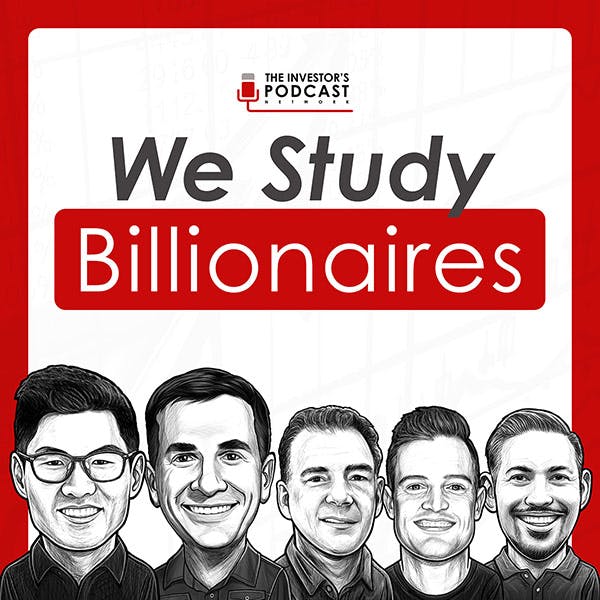
August 9, 2024 • 1hr 7min
TIP650: Stock Market Bubbles, AI, & Climate Change w/ Jeremy Grantham
We Study Billionaires - The Investor’s Podcast Network

Key Takeaways
- Market valuation concerns: Jeremy Grantham believes the current US stock market is extremely overvalued based on historical measures, potentially setting up for a major decline
- AI and tech bubble parallels: While AI is a transformative technology, Grantham sees parallels to past bubbles like the 1990s tech bubble where excitement outpaced fundamentals
- Quality stocks outperform: Over long periods, high-quality stocks tend to outperform despite having lower risk profiles, which Grantham views as a market inefficiency
- Climate change and toxicity risks: Grantham is heavily focused on climate change and chemical toxicity as existential risks that require urgent action and regulation
- Population decline concerns: Falling birth rates and fertility issues could lead to economic shocks and reduced ability to address other challenges
- China's green tech dominance: China has taken a commanding lead in many green technologies and scientific output, which Grantham finds concerning for the West
Introduction
In this episode, host Clay Finck interviews legendary investor and market historian Jeremy Grantham. As co-founder of asset manager GMO, Grantham has successfully identified and avoided major market bubbles over his 50+ year career. He shares his current views on market valuations, parallels to past bubbles, the impacts of AI, and his focus on climate change and other long-term risks facing humanity and the economy.
Topics Discussed
Early Career Lessons (2:07)
Grantham recounts his early experiences in the late 1960s investing in microcap stocks during a speculative bubble:
- Made exceptional returns initially on stocks like American Raceways, which tripled in 3 weeks
- Learned painful lessons when the bubble burst, losing most gains
- "From that day on, I tended to be much more conservative and pretty much a dedicated, serious value manager for the rest of my career."
Current Market Valuations (6:16)
Grantham expresses major concerns about current US stock market valuations:
- Based on the most predictive valuation measures, the market is more overvalued than peaks in 1929 and 2021
- Historically, periods of extreme overvaluation have been followed by major economic and market declines
- The market is extremely poor at predicting future economic conditions at extremes
- "This is the most vulnerable market there has ever been."
AI and the Recent Market Rally (12:11)
Grantham discusses the impact of AI excitement on the recent stock market rally:
- ChatGPT release in late 2022 sparked a major rally in tech stocks, particularly the "Magnificent Seven"
- AI is a transformative technology but may not translate to corporate profits as expected
- Sees parallels to past bubbles where excitement outpaced fundamentals
- "AI is serious. Whether people will actually make real money is another matter."
Interest Rates and Recession Risks (15:29)
Grantham shares his views on interest rates and recession risks:
- Unemployment has risen to levels that have historically always preceded recessions
- The market seems to be pricing in a "soft landing" but Grantham is skeptical
- Most of the decline in bear markets historically occurs after the first interest rate cut
Grantham's History of Early Calls (25:10)
Grantham discusses his tendency to be early in calling market tops:
- Was 3 years early calling the top of the Japanese bubble in the late 1980s
- Was over 2 years early calling the top of the tech bubble in 1998
- Has been early in calling the current market a bubble
- "I have spent my entire life being early in the stock market."
Quality Stocks and Market Efficiency (30:44)
Grantham explains his views on quality stocks and market inefficiency:
- High-quality stocks have historically outperformed despite lower risk profiles
- This contradicts efficient market theory
- Quality stocks are a "free good" that tend to be overlooked in bull markets
- GMO offers products focused on quality stocks
Compounding Growth Limitations (35:48)
Grantham discusses the flaws in assuming indefinite compounding economic growth:
- Compound growth is mathematically impossible to sustain long-term on a finite planet
- Resource constraints and environmental damage limit growth potential
- 96% of mammal biomass is now humans and livestock, only 4% wild animals
- Chemical toxicity is damaging fertility and health
Climate Change and Green Energy (47:31)
Grantham shares his views on climate change and the green energy transition:
- Progress in wind, solar, and battery technology has far exceeded expectations
- But CO2 emissions continue to rise to record levels
- Capitalism lacks mechanisms to address "tragedies of the commons" like climate change
- Government regulation is needed to drive decarbonization
- Geothermal and fusion power show promise longer-term
Population Decline Risks (56:14)
Grantham expresses concerns about declining birth rates and population:
- Rapid population decline could shock economic systems
- May reduce resources available to address climate change and other challenges
- Chemical toxicity is contributing to fertility declines
- Hopes for gradual population decline over 5-6 generations to reach sustainable levels
China's Green Tech Dominance (58:15)
Grantham highlights China's commanding lead in green technologies:
- Produces 80% of solar panels and 90% of materials for panels
- Dominates EV production and battery materials
- Has overtaken the US in peer-reviewed scientific articles
- "They are moving at the rate of warp speed and they are dominating all the green new technologies and we better put our best foot forward."
Conclusion
Jeremy Grantham brings a wealth of experience and a long-term perspective to analyzing current market conditions and future risks. While extremely concerned about stock market valuations and the potential for a major decline, he sees transformative potential in technologies like AI and renewable energy. However, he believes capitalism and markets are poorly equipped to handle existential risks like climate change and chemical toxicity without significant government intervention. Grantham advocates for a clear-eyed view of these challenges while working urgently to address them.









